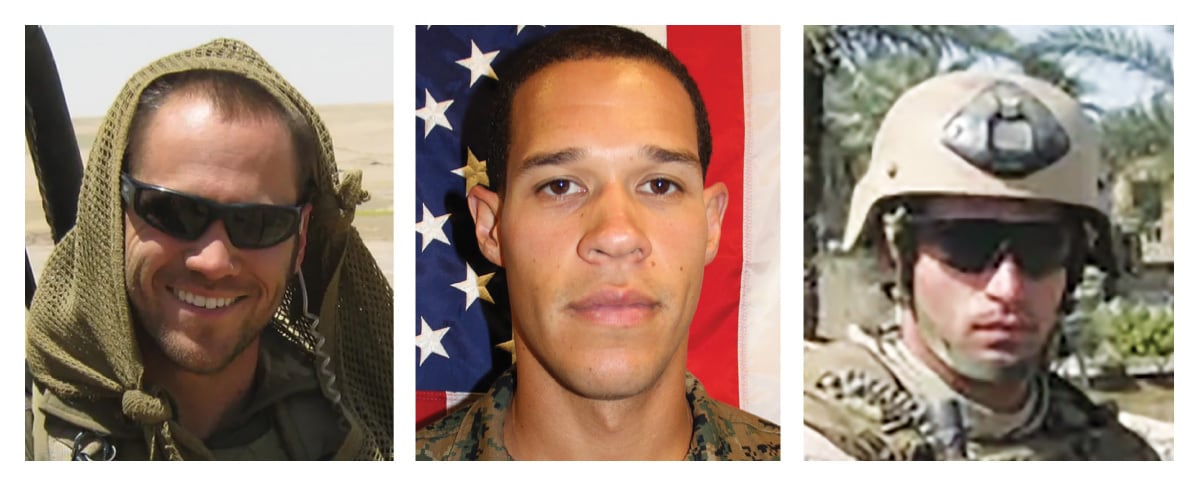CHERRY POINT, North Carolina — Two Marine Raiders are on trial for manslaughter following a 2019 altercation in Iraq with an Army veteran who died days later, but their defense team tried to suggest on Tuesday and Wednesday that the death may have been unrelated to the fight.
Previous days of the manslaughter and negligent homicide trial of Gunnery Sgts. Danny Draher and Josh Negron had centered on the early hours of Jan. 1, 2019.
At a bar in Irbil, Iraq, that New Year’s, civilian contractor and retired Green Beret Master Sgt. Rick Rodriguez had berated Navy Chief Petty Officer Eric Gilmet, according to security footage played at the trial.
After bouncers kicked Rodriguez out of the bar, Draher and Negron ended up in an altercation with the contractor on the street.
Witnesses for the prosecution said that Rodriguez got into Draher’s personal space and that Draher pushed him in response. Negron then punched Rodriguez, who fell, hit his head and quickly became unconscious, witnesses said. Rodriguez died days later.
Earlier in the trial, the defense team had tried to show that Rodriguez was belligerently drunk and the Marine Raiders were acting to defend themselves. (Gilmet, a co-accused, has appealed his case on the grounds of unlawful command influence and isn’t being tried as part of this trial.)
But on Tuesday afternoon and Wednesday, in cross-examinations of doctors who treated Rodriguez, the defense lawyers worked to sow doubt about the prosecution’s theory that the contractor died because of his head injury.
Negron attorney and Marine veteran Joseph Low asked the doctor who helped take Rodriguez to a nearby military medical facility about the conditions of the road on the way to the facility. The implication of Low’s questions appeared to be that Rodriguez could have sustained a head trauma during the ride.
Dr. Ashley Fang, then a Navy lieutenant, confirmed that an unconscious Rodriguez was transported in the bed of a truck for the bumpy ride on a gravel road, with Gilmet struggling to hold him in place.
On Wednesday, the defense tried to bring to light other possible causes of death as the prosecution played videotaped testimony from Dr. Benjamin Wierstra, a member of the Canadian military.
The testimony initially was detrimental to the “MARSOC 3,” as Draher, Negron and Gilmet are now informally called.
Responding to questions from prosecutors, Wierstra opined that Rodriguez could have been prevented from going into cardiac arrest if he had been taken to a hospital earlier rather than remaining under the care of Gilmet, an experienced combat corpsman, through the early morning.
But on cross-examination, Wierstra noted that he had found vomit in Rodriguez’s airway.
That testimony set the stage for Low to ask the neurosurgeon who later treated Rodriguez at a hospital in Baghdad if the contractor’s brain swelling could have been caused by an airway blockage — because of some combination of vomit, intoxication and sleep apnea — rather than an injury from the fight.
“There are many reasons the brain could swell,” said Dr. Abraham Sabersky, an Army lieutenant colonel.
But in response to a question by prosecutor Marine Lt. Col. Geoff Shows, Sabersky imparted his interpretation of the cause of death — and it was less favorable to the defense’s case.
In Sabersky’s view, a head injury rendered Rodriguez unconscious, which made it hard for him to control his airway, ultimately stopping his heart and cutting off oxygen to his brain.
Irene Loewenson is a staff reporter for Marine Corps Times. She joined Military Times as an editorial fellow in August 2022. She is a graduate of Williams College, where she was the editor-in-chief of the student newspaper.





